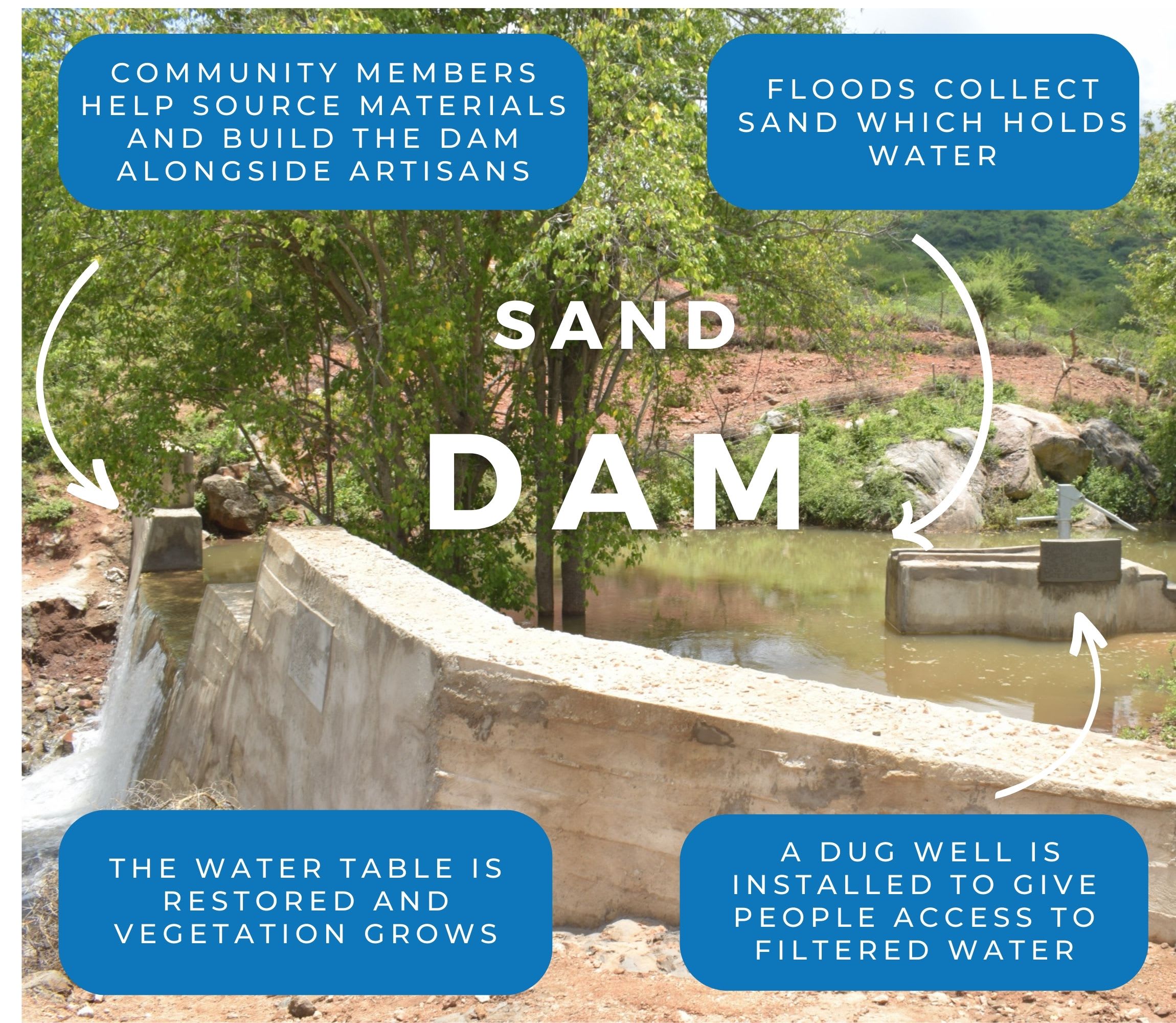Mbiuni Community is a relatively dry area that is home to some 1,500 people. The homesteads are sparsely populated as community members own large pieces of land. It was the wet season during the time of our last visit, making the area quite green and vegetative. However, the landscape turns gray-brown as soon as the dry season sets in. There are many thickets of bushes in the region, some of which have been cut to create roads that the community members use.
The most common livelihood in this region is farming. The area is well known for fruit and vegetable farming, particularly oranges, mangoes, spinach, and kale - when water is available. The community members have a fruit collection company situated in Mbiuni village where the residents deliver their fruits for sale and distribution to other parts of the country.
This area of Kenya is prone to receiving little to no rainfall due to the adverse effects of climate change. The water scarcity crisis impacts the community members negatively. People have to wake up very early in the morning and walk long distances from their homesteads to fetch water. The daily chore, which is mostly left to women and children, is extremely time-consuming.
The water source community members depend on is a seasonal river that dries up during the dry seasons. Hence, people here have been unable to secure an adequate, year-round water supply. Once the river bed dries, the community members lack water for their livestock and have to strain even more to get water. During the dry season, the women have to dig scoop holes into the dry riverbed to fetch water.
"The water situation is hard to live by. We have to strain to fetch water, and we are unable to engage in any productive activities such as farming, construction activities, and any personal development projects," shared Eluid Katunda Kyundu, a local farmer.
"At times, we have inadequate food supply at our homes due to insufficient water supply for farming and establishing food production projects such as vegetable gardens. I have to keep sending my children to fetch water whenever they leave school, and it deprives them a lot of their time to study, play, or even relax."
The river scoop holes are open, exposing community members to risks of diseases such as malaria, amoeba, and typhoid. Livestock seek out the scoop holes and drink from them directly, posing great health risks to these community members. At home, hygiene and sanitation practices are hard to manage and sustain due to the insufficient water supply. Things like handwashing and cleaning latrines are often sacrificed due to the lack of water, further putting families at risk of fecal-oral diseases and water-related illnesses.
Community members have reported several health risks due to drinking water from the scoop holes including typhoid, dysentery, and amoeba, among others. Families feel heavy financial repercussions when treating these diseases as the hospitals are located far away and the treatment costs for these illnesses are very high.
"Having water is important because I will have all my needs at home solved, mostly hygiene and sanitation needs. I have to go for several trips to the water point to ensure I have adequate water for cleaning the house, cooking food, washing clothes, and water for the livestock," said Peniah Musnei Thathi.
What we can do:
Our main entry point into Mbiuni Community has been the Nduti Self-Help Group, which is comprised of households that are working together to address water and food scarcity in their region. These members will be our hands and feet in constructing water projects and spreading the message of good hygiene and sanitation to everyone.
Sand Dam
After the community picked the ideal spot, our technical team went in and proved the viability by finding a good foundation of bedrock. Now, our engineers are busy drawing up the blueprints.
We are unified with this community to address the water shortage. As more sand dams are built, the environment will continue to transform. As the sand dams mature and build up more sand, the water tables will rise. Along with this sand dam, a hand-dug well will be installed to give community members an easy, safe way to access that water.
Building this sand dam and the well in this community will help bring clean water closer to hundreds of people living here.
Training
These community members currently do their best to practice good hygiene and sanitation, but their severe lack of water has hindered reaching their fullest potential.
We will hold hygiene and sanitation training sessions with the Nduti Self-Help Group and other community members to teach about important hygiene practices and daily habits to establish at the personal, household, and community level. This training will ensure that participants know they need to make the most out of their new water point as soon as the water is flowing.
One of the most important topics we plan to cover is handling, storing, and treating water. Having a clean water source will be extremely helpful, but it is useless if water gets contaminated by the time it is consumed. We will also emphasize the importance of handwashing.
The community and we strongly believe that all of these components will work together to improve living standards here, which will help to unlock the potential for these community members to live better, healthier lives.
We typically work with self-help groups for three to five years on multiple water projects. We will conduct follow-up visits and refresher training during this period and remain in contact with the group after all of the projects are completed to support their efforts to improve sanitation and hygiene.

 Sand Dam
Sand Dam
 Rehabilitation Project
Rehabilitation Project






























